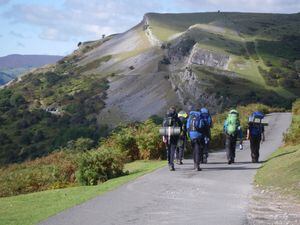How Duke's scheme gives youngsters the edge
Olivia Nicoll admits there are times when she wondered what she was doing.

"I think the hardest thing was walking across Dartmoor, four days of walking and climbing, it was dark, raining, horrendous weather," says the 17-year-old, who is now working towards her gold award.
"There were times when I was wishing I was at home in bed."
Probably not many, though. Olivia, a sixth-former at Wrekin College in Wellington, cannot recommend the Duke of Edinburgh Awards scheme highly enough, and like most of the youngsters taking part, describes the expedition as one of the highlights.
"I think its the satisfaction of completing something that is quite big," she says.
"I also think I have learned a lot about decision making, about thinking about things, rather than just jumping in and doing them."
The scheme has grown rapidly in popularity over the past few years. In 2016, a total of 271,439 young people started a bronze, silver or gold award, up by seven per cent on 2015, and the highest number since the scheme was launched in 1956.
Wrekin College has one of the highest rates of in the country for pupils completing the scheme, with more than a third of the pupils gaining their bronze, silver and gold awards. The number of youngsters signing up to the gold award, the highest level, nearly doubled last year, increasing from 18 to 30.
The school holds its own license to run the award with the majority of instructors being the members of teaching staff.
Physics teacher Anthony Francis-Jones, who has been running the scheme for 10 years, says the changes in some of the pupils who have taken part in the scheme is remarkable.
"You get children who are nervous, unsure of themselves, who might find it quite difficult to mix with others, you get groups of children who would never otherwise get together as a group, and by the end of the Duke of Edinburgh Award they are unrecognisable.
"They learn about personal discipline, organisation, team work, and with the ones who perhaps aren't academic, who find work hard, you often see them display a whole set of skills you didn't know that they had."
In an age when young people are frequently accused of being introverted, only able to communicate through their mobile phones or social media, Mr Francis-Jones says the scheme also forces them to come out of their shells and work together.
"Also, as teachers, if we only ever see the children in the classroom, that's all we can judge them on, but with the Duke of Edinburgh you see the other skills develop."
The bronze and silver schemes are made up of four main components – voluntary work, learning a skill, a physical activity and an expedition. While participation in strictly voluntary – this is a requirement of the scheme – more than 90 per cent of the Year 10 (fourth-form) pupils at Wrekin have signed up for the bronze award. The gold award, which is normally reserved for older pupils – also includes a residential component, where the youngsters have to live and work away from home for five days, taking part in a shared activity.
As part of her gold award, Olivia has been working in an Oxfam shop, helping to organise the merchandise and serve customers.
"I've really enjoyed that, you get to know the customers, many of them come in every week," she says.
At 18, Adam Jarzebowski is one of the oldest pupils at Wrekin taking part in the scheme, and as part of the scheme he has been helping an elderly widow around the house, including painting her fence.
"One thing it has given me is the realisation that there are people who really find it comforting having somebody to do things, they might not have much family left, and it helps just to talk to someone."
He says the expedition has taught him a lot about leadership and teamwork.
"I discovered that I really liked to lead, but there may also be other people who are the same, so you will have one person in charge of this job, another person in charge of that job, and that makes it easier."
At the other end of the scale are 15-year-olds Jon Bent and Cameron Mundell, who are working towards their bronze award. They have already completed their own two-day expedition around Long Mynd, navigating their way around using maps, and camping overnight by the side of the road.
"We did get a bit lost at one point, that may have been my fault, my compass wasn't working properly," says Cameron.
"I've discovered new skills that I didn't realise I had before, like map reading, and I've made new friends. "
The skills section enabled Jon to indulge in his hobby of shooting – he is Hunter Field Target air rifle Welsh champion – and he has also been helping recycle the school's waste for the voluntary component of the scheme.
Mr Francis-Jones says it is the real-life skills and experience which the scheme provides that helps young people stand out from the crowd in the jobs market, particularly at a time when so many youngsters leave school with an impressive collection of exam grades.
“The scheme combines so many different aspects that challenge youngsters to fulfil their potential, whether it be in terms of the physical activities they do, trying something new, or volunteering in the local community," he says.
“The award encourages young people to do something they may never have thought of trying and it gets them out of their comfort zone.
“Many see the challenge of the expedition section as being their personal highlight but lots of participants also talk about a new hobby they have tried as part of the skills section or the charity work they have done for their volunteering section."
The school has a 100 per cent completion rate for its gold award, and while most pupils will complete their tasks while at school, it has been known for them to return to finish it while at university.
The icing on the cake is a trip to St James's Palace, where they are presented with the award by a member of the Royal Family.
Mr Francis-Jones adds: “It is such a valuable qualification to have and it is highly coveted by employers who see it on a CV and immediately take a greater interest in that candidate for the job.”





